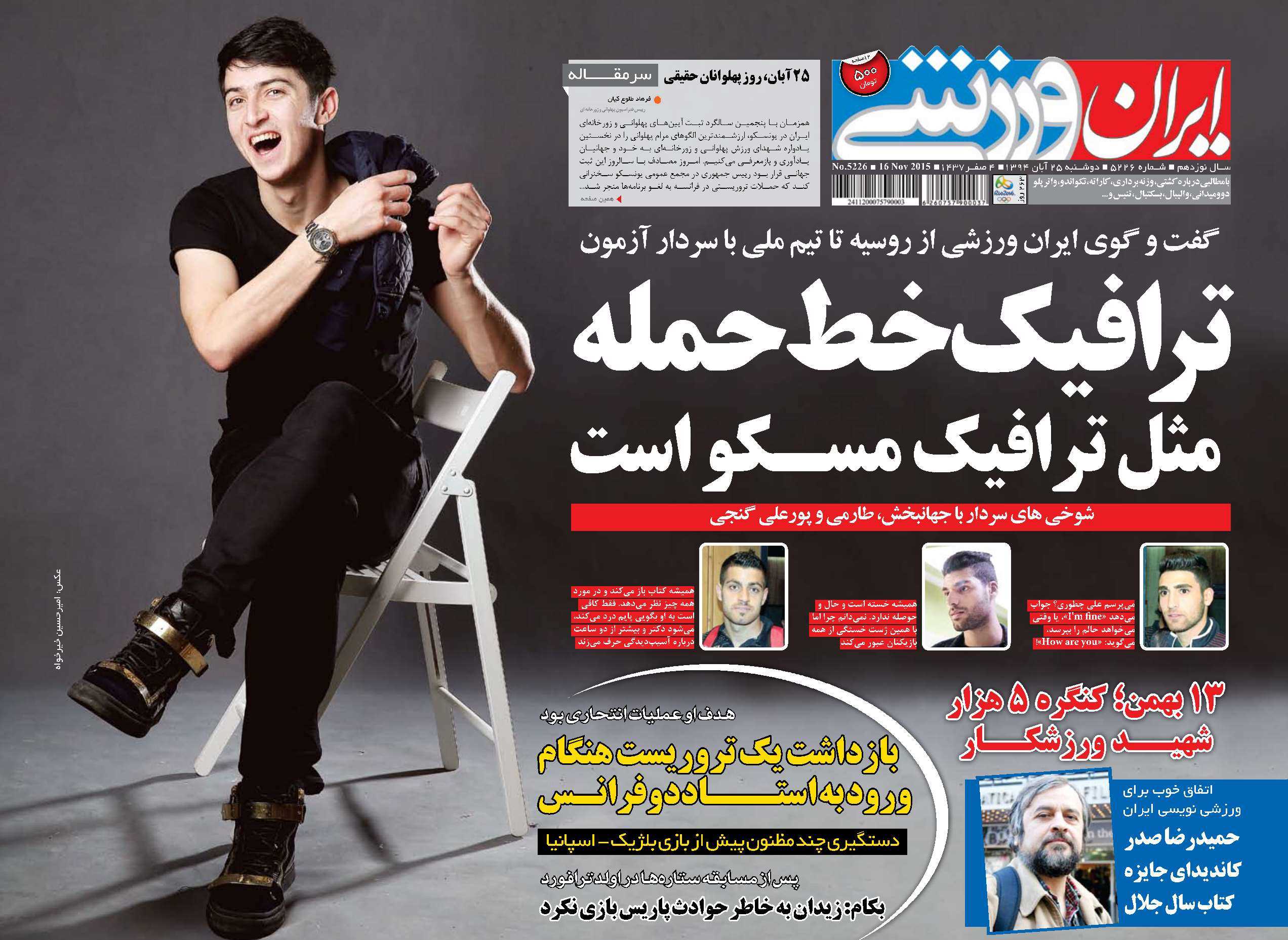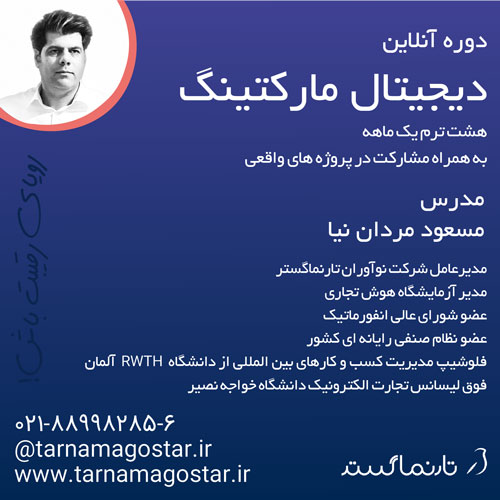عناوین این صفحه
-
اصلی به نام شفافیت در فدراسیون فوتبال

-
سانحه تلخ برای عمادرضا

-
رئیسجمهور: قهرمانی کشتی باعث شادی و افتخار ملت ایران شد

-
قهرمانی مقتدرانه فرشتاپن در پیست ایمولا

-
می شود به ما سهمیه ندهید؟

-
پسران زیر ۱۴ سال تنیس با مالزی دیدار میکنند

-
دروگبا، ناکام بزرگ انتخابات فدراسیون ساحل عاج

-
برگزاری تمرین یکشنبه پرسپولیس در سالن و زمین چمن

-
پولیشیچ، ناجی چلسی شد

-
اسکوچیچ: برای دیدن لژیونرها حتماً به اروپا میروم

-
قایدی همچنان میخواهد خارج از کشور بازی کند

جستجو بر اساس تاریخ
نظرسنجی
شماره : 7020 /
۱۴۰۱ دوشنبه ۵ ارديبهشت
|
|
اصلی به نام شفافیت در فدراسیون فوتبال
شهاب عزیزی خادم رئیس قبلی فدراسیون فوتبال دوشنبه 26 مهر سال گذشته در برنامهای تلویزیونی با صراحت از شفافیت کامل در فدراسیون فوتبال حرف زد. آنقدر قاطع که همه خبرگزاریها از این تیتر استفاده کردند «عزیزی خادم: در فدراسیون فوتبال همه چیز شفاف است».
حالا بعد از گذشت ماهها از آن گفتوگوی تلویزیونی، آسانتر میتوان درباره حقیقت و شفافیت در فدراسیون فوتبال سخن گفت. البته عزیزی خادم در سخنرانی خود بعد از انتخابش به عنوان رئیس فدراسیون فوتبال (مجمع اسفند 1399) وعدههایی داد که بسیاری از آنها عملی نشد.
اکنون که آمار و اسناد مربوط به پرداختیهای عزیزی خادم به دوستان و نزدیکانش، حاشیهها و صدای زیادی ایجاد کرده است، همه حقیقتی که فدراسیون او از مردم پنهان نگه میداشت علنی شد تا روشن شود تنها چیزی که در فدراسیون عزیزی خادم در اولویت قرار نداشت، اصل «شفافیت» بود. فدراسیونی که هر ادعای سخنگویش بلافاصله تکذیب میشد، حالا با ادعای مهر سال گذشته عزیزی خادم چه کند؟ سلولهای این فدراسیون با شفافیت بیگانه بود. آنقدر بیگانه که رئیس تا آخرین روز حرفی شفاف درباره ارتباط با جادوگر نزد... رئیس تا آخرین روز درباره حلقه دوستان نزدیکش در فدراسیون و تعداد سفرهای خارجی آنها هیچ نگفت. تا آخرین روز درباره 32 هزار یورویی که برای سفر عزیزی خادم و دوستانش به لیتوانی از شرکت توسعه بازرگانی برنا استقراض شد، حرف نزدند...
داستان این پنهانکاریها هنوز هم ادامه دارد و همین حالا هم بسیاری از حقایق مدیریت عزیزی خادم در این دوره کوتاه مشخص نیست و هنوز احدی نمیتواند با قاطعیت درباره ریخت و پاشهای ارزی فدراسیون برای سفرهای خارجی صحبت کند چون آمار دقیق آن اعلام نشده و همچنان در حال بررسی است. ما از عزیزی خادم متشکریم که تا این حد به موضوع شفافیت احترام گذاشت و همه اطلاعات و اسناد را رسانهای کرد. ما از مجمعی که به عزیزی خادم رأی داد هم متشکریم چون هر ویرانی که اکنون میبینیم نتیجه همان انتخاب است. فدراسیونی که نه نایب رئیس اول قانونی دارد نه نایب رئیس دوم قانونی و همه چیزش روی هواست. از مجمع برای انتخاب رئیس و نایب رئیس بانوان فدراسیون هم متشکریم.
سانحه تلخ برای عمادرضا
شب گذشته و در آخرین ساعات ارسال صفحات روزنامه به چاپخانه، خبر تلخی به دستمان رسید. عماد رضا مهاجم پیشین تیم ملی عراق و باشگاه سپاهان اصفهان، دچار یک سانحه شده اما در حال حاضر وضعیت جسمی مناسبی دارد. گویا او دو شب قبل، برای حضور در یک مراسم افطار به شهر نجف سفر میکند و بعد از صرف شام، تصمیم میگیرد به همراه دوستانش، راهی منطقهای تفریحی شود. عماد رضا در این منطقه، سوار قایق میشود که در مسیر به علت سرعت بالا، قایق واژگون میشود و در این سانحه، سر این پیشکسوت عراقی به یک جسم سخت برخورد میکند. او را فوراً به بیمارستان میرسانند و تحت عمل جراحی و مراقبتهای ویژه قرار میگیرد اما راوی این خبر تأکید کرد وضعیت خوبی دارد. او که خاطرات زیادی در ذهن اهالی فوتبال ثبت کرده بود، مدتی است هدایت تیم جوانان عراق را برعهده دارد. امیدواریم سانحهای که برای این پیشکسوت پیش آمده، به خیر بگذرد.
رئیسجمهور: قهرمانی کشتی باعث شادی و افتخار ملت ایران شد
رئیسجمهور در پیامی قهرمانی تیم ملی کشتی آزاد کشورمان در مسابقات قهرمانی آسیا را به عموم ملت شریف ایران تبریک گفت و از ورزشکاران، مربیان و دستاندرکاران ورزش کشتی صمیمانه
تشکر کرد.
آیتالله سید ابراهیم رئیسی در پیامی ضمن تبریک قهرمانی تیم ملی کشتی آزاد کشورمان در مسابقات قهرمانی آسیا، تصریح کرد: این پیروزی که به همت استعدادهای جوان کشتی کشورمان به دست آمد، جلوه دیگری از توانمندی، اراده و ظرفیت بالای جوانان عزیزمان را به نمایش گذاشت.
متن این پیام بدین شرح است:
کسب مدالهایی رنگارنگ و قهرمانی تیم ملی کشتی آزاد کشورمان در مسابقات کشتی قهرمانی آسیا مایه شادی، افتخار و بالندگی همه ملت ایران، خصوصاً علاقهمندان به ورزش شد. این پیروزی که به همت استعدادهای جوان کشتی کشورمان به دست آمد، جلوه دیگری از توانمندی، اراده و ظرفیت بالای جوانان عزیزمان را به نمایش گذاشت. اینجانب این موفقیت ارزشمند را به عموم ملت شریف ایران تبریک عرض میکنم و از یکایک ورزشکاران، مربیان و سایر دستاندرکاران ورزش کشتی صمیمانه تشکر میکنم.
سید ابراهیم رئیسی
رئیس جمهوری اسلامی ایران
قهرمانی مقتدرانه فرشتاپن در پیست ایمولا
مکس فرشتاپن با اقتدار قهرمان مسابقه بزرگ ایمولا شد. راننده تیم ردبول که مسابقه را از خط اول شروع کرد زودتر از همتیمیاش سرجیو پرز از خط پایان عبور کرد. فرشتاپن سال گذشته هم در این پیست به مقام اول رسیده بود و دیروز به بیست و دومین پیروزیاش در فرمول یک رسید.
شارل لکلر، راننده فراری که در رده سوم بود و برای رسیدن به رتبههای بالاتر تلاش میکرد، اشتباه بزرگی داشت و از مسیر خارج شد تا در نهایت به رده ششم برسد. این اتفاق به لندو نوریس، راننده تیم مکلارن کمک کرد که روی سکوی سوم بایستد.
این مسابقه برای لوئیز همیلتون و تیم مرسدس هم بسیار تلخ بود. قهرمان هفت دوره فرمول یک جهان مسابقه را در رده چهاردهم شروع کرد و در همان رده به پایان برد. این در حالی است که جرج راسل، دیگر راننده مرسدس بر سکوی
چهارم ایستاد.
نتایج مسابقه بزرگ ایتالیا رقابت در ردهبندی رانندگان را نزدیکتر کرد. لکلر با وجود لغزش در برابر هواداران خودی همچنان با 86 امتیاز صدرنشین است، ولی فرشتاپن به لطف این برد 59 امتیازی شد و فاصله را با راننده فراری کمتر کرد. سرجیو پرز و جرج راسل به ترتیب با 54 و 49 امتیاز سوم و چهارم هستند، در حالی که همیلتون با 28 امتیاز در رده هفتم است.
می شود به ما سهمیه ندهید؟
یادداشت
مازیار فیروزی
خبر که آمد ناخودآگاه لبخندی روی لبانم نشست. سهمیه ایران از فصل 2024 سه سهمیه مستقیم است و یک سهمیه غیر مستقیم. خبر خوبی بود اما یک سؤال مثل خوره مغزم را میخورد که چرا باید این اتفاق بیفتد؟ در دو سال آینده چه چیزی قرار است درست شود که در این همه سال نشده است؟
هنوز چند ماه بیشتر از حذف استقلال و پرسپولیس از آسیا نمیگذرد که آدم میماند از انتشار این خبر خوشحال باشد یا ناراحت؟ امسال در لیگ قهرمانان نه خبری از استقلال بود و نه پرسپولیس. هیچ اعتراضی هم نکردیم چون میدانستیم که گیر کار کجاست؟ خودمان را که نمیخواهیم گول بزنیم. اگر قرار باشد از ساختار شروع کنیم، باید گفت، نداریم! همینجا غائله ختم میشود، بدون تعارف.
قرار است در سهمیهبندی جدید عربستان، ژاپن، کرهجنوبی به همراه ایران 1+3 سهمیه داشته باشند و ازبکستان و قطر هم که در ردههای بعدی خواهند بود، سهمیه 2+2 را به خود اختصاص خواهند داد.
مشخص نیست که این خبر تا چه اندازه اجرایی خواهد شد چون در سایت کنفدراسیون فوتبال آسیا هنوز به صورت رسمی این خبر اعلام نشده است اما اگر یک روزی این مطلب را یکی از مسئولان تصمیم گیرنده در AFC خواند این خواهش را از ما قبول کند که سهمیه را افزایش ندهند! افزایش بدهند که چه بشود؟ دوباره استقلال و پرسپولیس سندسازی کنند و با بیان اینکه انتهای حرفهایگری هستند در آسیا بازی کنند؟ دو باشگاهی که هنوز کلی بدهی به این و آن دارند و آنقدر در طول سالیان اخیر پنجرهشان باز و بسته شده که از لولا درآمدهاند!
جای مسئولان تصمیمگیر در کنفدراسیون فوتبال آسیا (که حتی با کشورهای پیشرفتهای مثل کرهجنوبی و ژاپن هم شوخی ندارند) بودم قوانین را سختتر و سختتر میکردم تا اگر تیمی حرفهای نیست، اگر تیمی فقط القابی مشابه را یدک میکشد راهی لیگ قهرمانان آسیا نشود. چه این تیم استقلال باشد، چه پرسپولیس یا هر تیم دیگری در قاره کهن.
پسران زیر ۱۴ سال تنیس با مالزی دیدار میکنند
پسران کشورمان حریفان خود را در رقابتهای مقدماتی جهانی شناختند. رقابتهای مقدماتی جهانی در رده سنی زیر ۱۴ سال پسران به میزبانی هند قرعهکشی شد و بر این اساس، در گروه A تیمهای استرالیا، سوریه، لبنان و کرهجنوبی، در گروه B تیمهای ژاپن، اردن، هند و ازبکستان، در گروه C تیمهای ایران، تایلند، هنگکنگ و مالزی و در گروه D تیمهای قزاقستان، اندونزی، سریلانکا و پاکستان قرار گرفتند. تیم پسران کشورمان در مرحله گروهی مسابقات امروز در اولین دیدار این مرحله با تیم مالزی دیدار میکنند. مانی کاردان از مازندران، مانی ملاعسگری از تهران و رادین فهیمی از البرز به مربیگری فرشید زیدی به عنوان نمایندگان ایران در این تورنمنت به مصاف حریفان آسیایی خود میروند. این رقابتها از 5 تا ۱۰ اردیبهشت ماه به میزبانی هند برگزار میشود و تیمهای برتر، مجوز حضور در مسابقات جهانی را به دست میآورند.
دروگبا، ناکام بزرگ انتخابات فدراسیون ساحل عاج
دیدیه دروگبا در انتخابات فدراسیون فوتبال ساحل عاج ناکام شد. مهاجم پیشین چلسی که این هفته به تالار مشاهیر لیگ برتر معرفی شد، در دور اول انتخابات ریاست فدراسیون فوتبال ساحل عاج با کمتر از یک پنجم آرا کنار گذاشته شد. در نهایت یاسین ادریس دیالو، تاجر و یکی از اعضای اجرایی فعلی فدراسیون فوتبال ساحل عاج توانست سوری دیاباته را با ۶۳ رأی موافق شکست دهد.
انتخابات روز شنبه چندین بار عمدتاً به دلیل مسائل جاری در مورد صلاحیت نامزدها به تعویق افتاده بود. پس از اینکه فیفا یک کمیته عادیسازی را برای نظارت بر فوتبال ساحل عاج منصوب کرد، نامزدی دروگبا که در ابتدا رد شده بود پذیرفته شد.
دروگبا بیش از ۱۰۰ بار برای ساحل عاج از جمله در جام جهانی ۲۰۰۶ و ۲۰۱۰ بازی کرده اما در اوت ۲۰۲۰ به او گفته شد که واجد شرایط شرکت در انتخابات نیست. پس از مداخله فیفا، دروگبای ۴۴ ساله که چهار قهرمانی لیگ برتر، چهار جام حذفی و لیگ قهرمانان اروپا را در دو دوره با چلسی کسب کرد، به صحنه انتخابات برگشت.
با این حال، بهترین گلزن تاریخ ساحل عاج تنها با ۲۱ رأی در دور اول حذف شد، زمانی که دیالو (۵۹ رأی) و دیاباته (۵۰ رأی) کسب کردند و رقابت این دو به دور دوم راه یافت. دستاوردها و برنامه بلندپروازانه دروگبا برای توسعه فوتبال در ساحل عاج محبوبیت او را افزایش داده بود و پس از شکست او، بسیاری از هواداران او روز شنبه خشم خود را در شبکههای اجتماعی ابراز کردند.
مأموریت دیالو ۴ سال است و سازماندهی جام ملتهای آفریقا ۲۰۲۳ که ساحل عاج میزبان آن است، اولین چالش بزرگ او خواهد بود.
ساحل عاج در سالهای ۱۹۹۲ و ۲۰۱۵ توانسته قهرمان آفریقا شود، ولی در جام جهانی قطر حضور ندارد.
برگزاری تمرین یکشنبه پرسپولیس در سالن و زمین چمن
تیم فوتبال پرسپولیس، تمرین روز گذشته (یکشنبه) را از ساعت 17:30 در ورزشگاه شهید کاظمی آغاز کرد.
این تمرین در دو بخش اجرا شد. بازیکنان ابتدا در سالن بدنسازی حاضر شدند و به مدت نیم ساعت کار با وزنه را در برنامه داشتند.
پس از آن با ورود به زمین چمن، بخشهای مختلف تمرین مثل پاسکاریهای کوتاه و ترکیبی، حفظ توپ و فوتبال درون تیمی را در دستور کار قرار دادند.
تمرین دیروز 90 دقیقه به طول انجامید و به جز وحید امیری و فرشاد فرجی که زیر نظر کادر پزشکی هستند، سایر بازیکنان بدون مشکل در اختیار کادر فنی قرار داشتند.
بازیکنان تمرین شاداب و مهیجی را پشت سر گذاشتند؛ بخصوص در بخش فوتبال درون تیمی که دو تیم سفید و مشکی با کریخوانی فراوان به مصاف هم رفتند و در نهایت تیم سفید برنده این بازی شد.
همچنین کادر فنی تأکید ویژهای روی انجام صحیح تاکتیکها و مسائل فنی داشت. بازیکنان در پایان بدنها را سرد و راهی رختکن شدند.
سهمیه ۱+۳ ایران در لیگ قهرمانان آسیا از فصل ۲۰۲۴
سهمیه ایران از لیگ قهرمانان آسیا از فصل ۲۰۲۴، سه سهمیه مستقیم و یک سهمیه غیر مستقیم خواهد بود.
بر اساس گزارش سایت «فوتی رنکینگز» ردهبندی نهایی لیگهای آسیایی که برای تخصیص سهمیه به فدراسیونهای عضو AFC در مسابقات باشگاهی تحت نظر این کنفدراسیون در پایان فصل 2022 اعلام خواهد شد، سهمیههایی است که برای فصل 2024 لحاظ خواهد شد. ردهبندی لیگهای آسیایی بر اساس نتایج ورزشی تیمهای باشگاهی فدراسیونهای عضو در چهار فصل گذشته ارزیابی میشود.
بر اساس گزارش این سایت؛ ایران در ردهبندی پایانی فصل 2022 با یک پله صعود در رده چهارم و پس از لیگهای عربستان، ژاپن و کره جنوبی قرار خواهد گرفت و سهمیهاش برای حضور در لیگ قهرمانان آسیا 1+3 (3 سهمیه مستقیم و یک سهمیه پلیآف) خواهد رسید. در حال حاضر سهمیه ایران در لیگ قهرمانان آسیا 2+2 (2 سهمیه مستقیم و 2 سهمیه پلیآف) است.
عربستان، ژاپن، کره جنوبی و ایران برای فصل 2024 لیگ قهرمانان آسیا همگی 1+3 سهمیه خواهند داشت و ازبکستان و قطر هم که در ردههای بعدی خواهند بود، سهمیه 2+2 را به خود اختصاص خواهند داد.
پولیشیچ، ناجی چلسی شد
پس از نمایش پر انتقاد و شکست خانگی مقابل آرسنال، چلسی با گل دقایق پایانی ایوان پولیشیچ توانست وستهم را یک بر صفر شکست دهد و موقعیتش در رده سوم لیگ برتر را تثبیت کند.
چلسی در این بازی نمایش چندان خوبی نداشت تا اینکه در دقیقه 84 به یک پنالتی رسید. کرگ داوسون در این صحنه لوکاکو را متوقف کرد تا از زمین اخراج شود، ولی جورجینیو ضربه آرامی زد تا فابیانسکی براحتی آن را مهار کند.
چلسی به حملاتش ادامه داد تا سرانجام در دقیقه 90 توانست مقاومت وستهم ده نفره را بشکند. در این صحنه پولیشیچ که تازه به زمین رفته بود، سانتر زمینی مارکوس آلونسو را به گوشه دروازه فرستاد.
چلسی با این برد 65 امتیازی شد و منتظر بازی عقب افتاده پنجشنبه در زمین منچستریونایتد است. وستهم که پنجشنبه در نیمهنهایی لیگ اروپا میزبان فرانکفورت است، با این شکست در امتیاز 52 باقی ماند.
در دیگر بازی مهم عصر دیروز برنلی توانست ولورهمپتون را یک بر صفر ببرد تا برای بقا امیدوارتر شود. برنلی بعد از اخراج شان دایچ، توانسته در سه بازی 7 امتیاز بگیرد و با این روند بخت زیادی برای ماندن در لیگ برتر خواهد داشت. عصر دیروز بازی برایتون و ساوتهمپتون هم با تساوی 2-2 به پایان رسید.
اسکوچیچ: برای دیدن لژیونرها حتماً به اروپا میروم
دراگان اسکوچیچ با شکل دعوت از بازیکنان و تاکتیکهای انتخاب کرده برای تیم ملی صراحتاً این مسأله را نشان داده است که اساس کارش برای جام جهانی استفاده پررنگ از لژیونرهای کشورمان است.
به هر حال ما بازیکنان بسیار خوبی در خارج از ایران داریم و هیچ مربیای به همین راحتی از کنار نام آنها عبور نخواهد کرد.
سرمربی تیم ملی که زمستان گذشته بازی چند لژیونر کشورمان را در اروپا از نزدیک مشاهده کرده بود، به تعدادی از این نفرات قول داده که حتماً تابستان امسال و قبل از آغاز جام جهانی بار دیگر مسابقاتشان را با حضور در ورزشگاهها از نزدیک نظاره خواهد کرد و به طور دقیق عملکرد این نفرات را زیر ذرهبین خواهد برد.
اسکوچیچ از این بابت مربی بسیار خوشبختی است چون فوتبال ایران هرگز این حجم از بازیکنان آماده در تیمهای خارجی نداشته است.
قایدی همچنان میخواهد خارج از کشور بازی کند
حرفهایی که سرمربی الاهلی امارات در مورد مهدی قایدی بر زبان آورد، آب پاکی را روی دست این بازیکن ریخت. مهدی علی صراحتاً عنوان کرد قایدی بازیکن خوبی تلقی میشود ولی شبانهروز در فکر تفریح و خوشگذرانی است به همین خاطر به چنین فوتبالیستی احتیاج ندارد. این بازیکن حالا حتی در فهرست ۱۸ نفره الاهلی هم قرار نمیگیرد و بحث جداییاش از این باشگاه اماراتی به طور جدی مطرح شده است.
کاملاً طبیعی بود به موازات مطرح شدن قضیه جدایی مهدی قایدی از الاهلی، استقلالیها بخواهند زمینه برای بازگشت این فوتبالیست فوقالعاده تکنیکی به جمع نفرات خود در فصل آینده را فراهم کنند ولی از قرار معلوم مهدی قایدی همچنان میخواهد در خارج از ایران فوتبال بازی کند و حتی اگر از الاهلی جدا شود باز هم گزینه اول او یک تیم خارجی دیگر است و در صورتی به استقلال برمیگردد که پیشنهاد مناسبی از خارج نداشته باشد.
|
|
آدرس مطلب:
آدرس مطلب:
آدرس مطلب:
آدرس مطلب:
آدرس مطلب:
آدرس مطلب:
آدرس مطلب:
آدرس مطلب:
آدرس مطلب:
آدرس مطلب:
آدرس مطلب:
آدرس مطلب:
آدرس مطلب:
|
ویژه نامه | آرشیو































